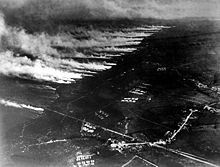1915: The First Use of Chemical Weapons in WWI
The Second Battle of Ypres, a major battle during World War I, is remembered for a significant event that took place on April 22, 1915. It was on this day that German forces unleashed chlorine gas against French and Canadian troops, marking the first large-scale use of chemical weapons on the battlefield. This event introduced a new and more horrific method of warfare, forever changing the face of conflict.
The Devastating Impact of Chlorine Gas
The use of chlorine gas during the Second Battle of Ypres had devastating consequences. As the gas engulfed the trenches, soldiers were subjected to its toxic effects. Chlorine gas attacks the respiratory system, causing severe burns to the lungs and suffocation. The troops faced excruciating pain and struggled to breathe as the gas filled the air around them.
The effects of the gas were immediate and horrifying. Many soldiers died within minutes of exposure, while others suffered long-lasting injuries. The use of chemical weapons in this battle resulted in thousands of casualties, both fatal and non-fatal.
Widespread Condemnation and a Reevaluation of Warfare
The use of chemical weapons during the Second Battle of Ypres shocked the world and led to widespread condemnation. The international community recognized the need to reevaluate the rules of armed conflict and establish guidelines to prevent the use of such horrific weapons in the future.
The Geneva Protocol of 1925 was a direct response to the use of chemical weapons in World War I. It prohibited the use of chemical and biological weapons in warfare, setting a precedent for the international community to uphold. The events of April 22, 1915, played a significant role in shaping international law regarding the conduct of warfare.
Lasting Implications
The first use of chemical weapons in World War I had lasting implications for future military engagements and the development of protective measures. The introduction of chemical warfare necessitated the development of gas masks and other protective gear to mitigate the effects of these deadly substances.
Additionally, the psychological impact of chemical weapons cannot be overlooked. The use of chlorine gas and other toxic substances created a sense of fear and horror among soldiers, further exacerbating the already traumatic nature of war.
It is important to remember the events of April 22, 1915, as they serve as a stark reminder of the brutal nature of war. The use of chemical weapons during the Second Battle of Ypres forever changed the way conflicts are fought and highlighted the need for international regulations to prevent the use of such devastating weapons.
For more information on the First Use of Chemical Weapons in WWI, you can refer to the following external references:
- History.com – Chemical Weapons in World War I
- BBC News – The First Gas Attack
- Imperial War Museums – Chemical Warfare in World War One

